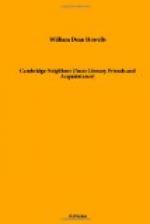Boyesen’s energies were inexhaustible. He was not content to be merely a scholar, merely an author; he wished to be an active citizen, to take his part in honest politics, and to live for his day in things that most men of letters shun. His experience in them helped him to know American life better and to appreciate it more justly, both in its good and its evil; and as a matter of fact he knew us very well. His acquaintance with us had been wide and varied beyond that of most of our literary men, and touched many aspects of our civilization which remain unknown to most Americans. When he died he had been a journalist in Chicago, and a teacher in Ohio; he had been a professor in Cornell University and a literary free lance in New York; and everywhere his eyes and ears had kept themselves open. As a teacher he learned to know the more fortunate or the more ambitious of our youth, and as a lecturer his knowledge was continually extending itself among all ages and classes of Americans.
He was through and through a Norseman, but he was none the less a very American. Between Norsk and Yankee there is an affinity of spirit more intimate than the ties of race. Both have the common-sense view of life; both are unsentimental. When Boyesen told me that among the Norwegians men never kissed each other, as the Germans, and the Frenchmen, and the Italians do, I perceived that we stood upon common ground. When he explained the democratic character of society in Norway, I could well understand how he should find us a little behind his own countrymen in the practice, if not the theory of equality, though they lived under a king and we under a president. But he was proud of his American citizenship; he knew all that it meant, at its best, for humanity. He divined that the true expression of America was not civic, not social, but domestic almost, and that the people in the simplest homes, or those who remained in the tradition of a simple home life, were the true Americans as yet, whatever the future Americans might be.
When I first knew him he was chafing with the impatience of youth and ambition at what he thought his exile in the West. There was, to be sure, a difference between Urbana, Ohio, and Cambridge, Massachusetts, and he realized the difference in the extreme and perhaps beyond it. I tried to make him believe that if a man had one or two friends anywhere who loved letters and sympathized with him in his literary attempts, it was incentive enough; but of course he wished to be in the centres of literature, as we all do; and he never was content until he had set his face and his foot Eastward. It was a great step for him from the Swedenborgian school at Urbana to the young university at Ithaca; and I remember his exultation in making it. But he could not rest there, and in a few years he resigned his professorship, and came to New York, where he entered high-heartedly upon the struggle with fortune which ended in his appointment in Columbia.




